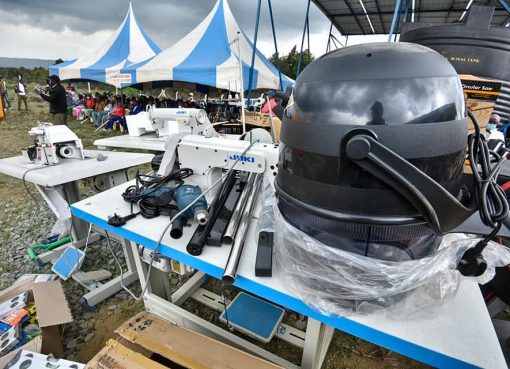Climate change is now a concern of every government and stakeholders in this era, due to environmental devastation that has been seen not just in this country but in the entire world.
Climate change has been brought about by destruction of the environment through pollution and cutting down of trees and the negative impact of this destruction has had distressing effects not only to human life but also to flora and fauna.
Early this year, Kenya experienced the wrath of Mother Nature when furious floods swept various parts of the country killing scores of people, sweeping away homesteads, crops and animals leaving thousands of people homelessness and without a means of livelihoods.
It’s worth noting that this happened when the country was smarting from yet an overwhelming drought that took away livelihoods of people, especially in arid and semi- arid counties
As of 2021, the National Forest Resources Assessment (NFRA) Report 2021 indicates that Kenya’s forest cover stood at 8.8 percent falling short of the minimum target of 10 per cent set by Kenya’s 2010 Constitution and the United Nations (UN).
In total, Kenya has roughly over seven million hectares of forests, majority of which is commercial or exotic. This means indigenous forests which take more time to mature are disappearing at an alarmism rate. The NFRA report further indicates that up to 37 counties out of the 47 counties have a tree cover percentage greater than 10 percent.
Forest cover is unevenly distributed across the country with the central region, parts of western and the coast region being the most forested.
But at a lighter side another IFRA report shows that Kenya’s tree cover now stands at about 12 per cent. This means that Kenya has attained and exceeded the constitutional threshold of having 10 percent tree cover as obligated in Article 69, Section 1 (a) of the Constitution.
The Government having noted the effects of this climate change, in 2022 came up with an ambitious plan to plant 15billion trees in in 10 years and have a forest cover of about 30 per cent in order to mitigate the effects of this climate change phenomenon. The campaign aims at reducing greenhouse emissions, stopping, and reversing deforestation among other effects of climate change.
Through our Vision 2030 target of having at least 10 percent forest cover by 2030, the Government has boarded on a number of forest restoration activities including committing to plant five million trees each year and has branded an area of 5.1 million hectares that has potential for restoration of trees.
To support these Government efforts to fight climate change, two organizations are seeking to help institutions and individual homes to embrace eco- friendly cookers which will help stem cutting down trees for firewood.
The first organization; Faith Engineering Works company is partnering with these institutions to install the steam cookers which utilizes steam to make food for hundreds of people.
The Sales Executive of the company; Jeconia Oyolla while showcasing this technology during a Technical, Vocational Education Institutions (TVETs) International Conference in Naivasha said the cooker has a boiler which releases steam which cooks the food and uses only a quarter of the amount of fuel required to cook the same amount of food.
The cookers also come with a safety-valve, temperature and pressure regulators, all in a bid to ensure safety in the kitchen where mass production of food is being done.
“In effect, the workers will be working in a clean environment with no smoke or soot, which improves their health and will have more time on their hands to do other engagements and the food will be clean and can never burn,” Oyolla says.
He notes that that it costs on the upward of sh7million to install in an institution, depending on its capacity but saves 60 to 70 per cent of the cost of fuel and the institution can recoup the installation cost in three to four years. This saving cannot also be used to repay the cost of installation, it was done on a bank loan for instance and has no repair costs and keeps the kitchen clean too because there will be no smoke or soot to make it require cleaning or re -painting.
Oyolla says they have already installed these facilities in several learning institutions and is urging more institutions to take up this innovation because it’s cost- effective in the long-run, as institutions contribute to deforestation due to massive amounts of firewood they use.
Another company; Nyalore Impact Company based in Homa -Bay is also promoting the use of electric pressure cookers in homes which also help save the environment. Charles Mwangi; a sales executive of the company while showcasing this invention at the same event said the cookers are timesaving and cook virtually thing including deep frying.
The company Sales Executive says the electric cookers use very limited energy, making them cost-effective and are faster, clean and not noisy at all.
“The cookers are faster, safer, and cook virtually every type of food including deep frying. It uses only one unit of electricity to cook for one hour because it doesn’t use electricity continuously because of the thermostat therein, thus saving 79 per cent of the cos of energy. It costs between three to seven shillings (sh3 to 7),” he says.
Mwangi says the cookers which cost between sh10.000 to 12,600 and are also ideal for big institutions but the investment is worthwhile.
But these investors are apprehensive about the imminent introduction off eco-levy and say might erode the perceived gains the Government would have made from such ventures in saving the environment.
This tax was in the budget proposal that was rejected by Kenyans recently but the Government has shown interest in re- introducing it during the coming Supplementary Budget.
By Mabel Keya – Shikuku





